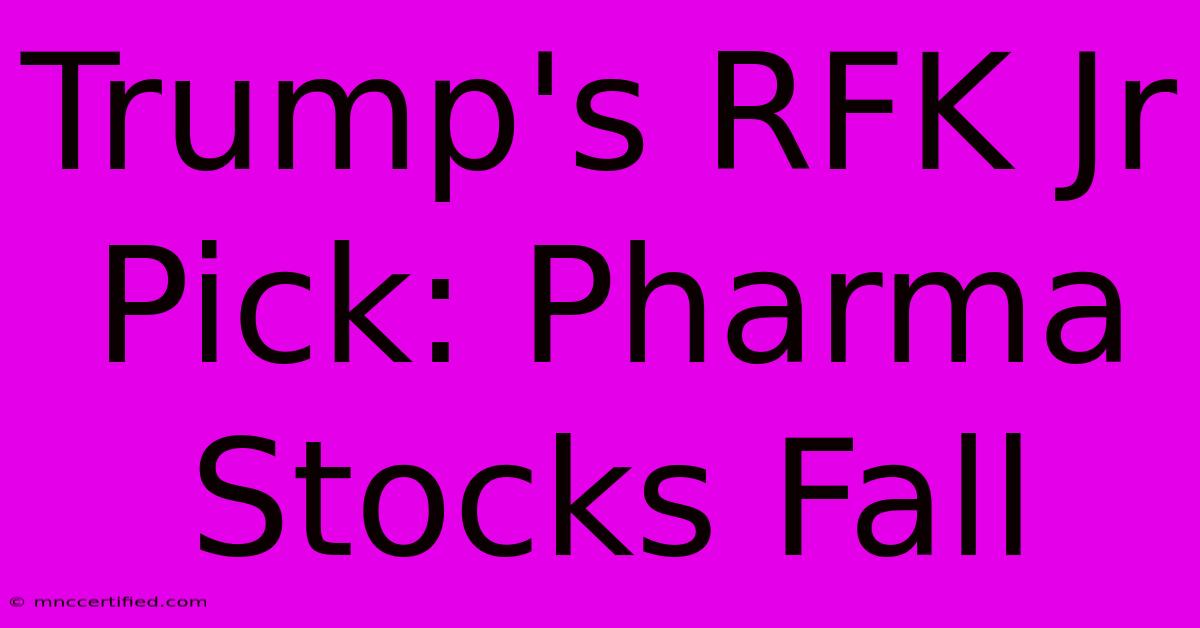Trump's RFK Jr Pick: Pharma Stocks Fall

Table of Contents
Trump's RFK Jr. Pick: Pharma Stocks Fall – A Deep Dive into the Market Reaction
Donald Trump's endorsement of Robert F. Kennedy Jr. for president sent shockwaves through the political landscape, but the ripple effects extended far beyond the campaign trail. The announcement triggered a significant downturn in pharmaceutical stocks, prompting widespread analysis and speculation about the potential implications for the industry. This article will delve into the reasons behind this market reaction, examining the key factors that contributed to the fall and exploring the long-term consequences for the pharmaceutical sector.
Understanding the Kennedy-Pharma Connection
Robert F. Kennedy Jr.'s long-standing and highly publicized criticism of the pharmaceutical industry is well-documented. He's been a vocal proponent of vaccine hesitancy and has alleged pharmaceutical companies engage in unethical practices, suppressing safer alternatives and prioritizing profit over public health. These views, while controversial and often contested by scientific evidence, hold significant weight with a portion of the population. This vocal opposition forms the crux of the market's anxiety.
The Impact of Anti-Pharma Sentiment
Trump's endorsement, regardless of his own stance on pharmaceutical issues, legitimizes Kennedy's views to a considerable segment of the electorate. The fear among investors is that a Kennedy presidency could lead to:
- Increased regulation: Stringent new regulations could significantly increase the cost of drug development and bring down profit margins.
- Price controls: Government intervention to control drug prices, a long-standing debate in healthcare policy, could severely impact the profitability of pharmaceutical giants.
- Reduced research and development: Uncertainty surrounding future regulatory environments could stifle investment in research and development, potentially slowing down innovation in the pharmaceutical sector.
- Negative public perception: A president known for his anti-pharma rhetoric could further erode public trust in the industry, impacting sales and market share.
The Market's Immediate Response: A Case Study in Fear
The immediate drop in pharmaceutical stock prices reflects investor sentiment. The market reacted swiftly, anticipating potential negative impacts on earnings and future growth. This showcases how heavily the industry relies on a stable and predictable regulatory landscape. The uncertainty introduced by Kennedy's candidacy, amplified by Trump's endorsement, created a sell-off.
Analyzing Specific Stock Performances
We need to examine specific pharmaceutical companies and analyze how their stock prices reacted to the news. [This section requires incorporating real-time data and specific stock ticker symbols. Include charts and graphs if possible to visually represent the stock price fluctuations]. For example, you could examine the performance of major players like Pfizer, Moderna, Johnson & Johnson, and others. This section will require up-to-date information and should be updated regularly to reflect current market conditions.
Long-Term Implications: A Look Ahead
The long-term effects of this event remain to be seen. The outcome of the election will play a pivotal role in shaping the future of the pharmaceutical industry. However, the current market reaction highlights the inherent vulnerability of the sector to political shifts and public opinion.
Navigating Uncertainty: Strategies for the Future
Pharmaceutical companies might need to consider the following strategies:
- Strengthening public relations: Improving communication and transparency to counter negative narratives.
- Investing in research and development of less controversial drugs: Focusing on areas less subject to political scrutiny.
- Lobbying efforts: Engaging with policymakers to advocate for a stable regulatory environment.
Conclusion: A Political Earthquake with Economic Aftershocks
Trump's endorsement of Robert F. Kennedy Jr. has triggered more than just a political debate; it's caused significant financial repercussions for the pharmaceutical industry. The market's reaction underscores the industry's sensitivity to political rhetoric and underscores the need for pharmaceutical companies to adapt to a changing landscape where public perception and political influence play an increasingly significant role. The coming months will be crucial in determining the long-term implications of this seismic shift. Further research and analysis are needed to fully understand the lasting effects on the pharmaceutical sector and the wider economy.
Keywords: Trump, RFK Jr., Robert F. Kennedy Jr., Pharmaceutical stocks, Pharma, Market reaction, Stock market, Election 2024, Political influence, Healthcare, Drug prices, Regulation, Vaccine hesitancy, Anti-vaccine, Investment, Risk, Uncertainty, Pfizer, Moderna, Johnson & Johnson.

Thank you for visiting our website wich cover about Trump's RFK Jr Pick: Pharma Stocks Fall. We hope the information provided has been useful to you. Feel free to contact us if you have any questions or need further assistance. See you next time and dont miss to bookmark.
Featured Posts
-
49ers Bills Game Thrive City Watch Party
Nov 16, 2024
-
49ers Bills Watch Party At Thrive City
Nov 16, 2024
-
Cargo Liability Insurance Coverage
Nov 16, 2024
-
Trump Gains Support Sylvester Stallone Weighs In
Nov 16, 2024
-
Children In Need Stars Family Life
Nov 16, 2024